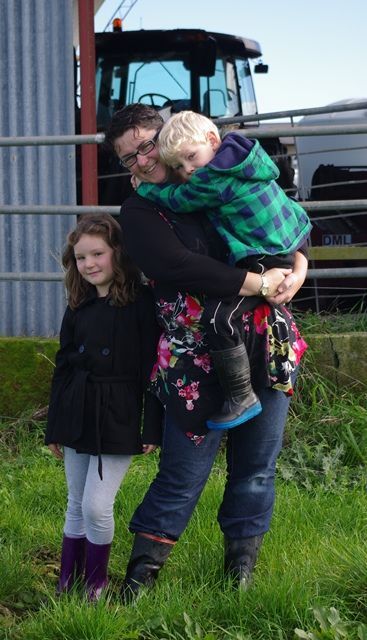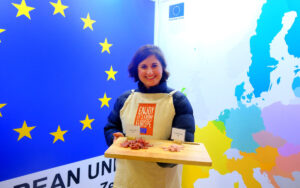Such is life, for a farmer’s wife
Megan Owen is a mother of two and loving wife to farmer Jason. Lucy Bennett talks to Megan about what it’s like to be married to a farmer.
It’s a cold and miserable autumn day in the Waikato, which is pleasant to observe from the warmth of a farm kitchen. The near 360 degree view from Megan Owen’s dining room window is a panorama that takes in Lake D where she and husband Jason sometimes take their kids waterskiing. There’s a distinct sense of isolation, although the settlement of Horotiu is just a 10 minute drive away. Megan refers to their situation as “rural-ish”, which is slightly at odds with the seemingly endless paddocks that surrounds the house. Sitting down at the table with a coffee and not a home-made scone in sight (“I’m no baker” Megan laughs), it’s time to get into what it’s really like to be a modern working woman and mother, who also happens to be married to a farmer.

Originally from Wellington where she grew up in the coastal suburb of Island Bay, Megan does not descend from generations of farmers as many of her contemporaries do. In fact it wasn’t until her work in food technology and engineering brought her to the Waikato and introduced her to her husband that farming seemed like a good idea, and even then it wasn’t hers. It was Jason, at the time a dairy farm consultant, who one day said “I think I want to go share milking” – and so they did.
Share milking has been the family’s main source of income since they bought their first cows in 1999. Fourteen years later and now with two young children, Megan reflects on how her family’s rural lifestyle is perceived by young ambitious farmers keen to get into share milking. “If you came here on the right day, you’d see Jason come in from milking at 5 o’clock, we’ll have a picnic dinner down [at the lake] and go waterskiing for the evening. Which you know, might happen three times in four years. And then you spend six weeks in mud and dirt getting up at 5 in the morning getting the calves in, thinking ‘this isn’t what I signed up for!’”
Megan’s day to day life displays the renowned female affinity with multi-tasking. She is a full time mum, manager of the finances and administration for the business side of the farm, does pro bono business consulting for a handful of clients, and is also an active member of charitable organisation Rural Women New Zealand.
Rural Women New Zealand supports, represents, and connects people in rural communities. According to communications officer Jackie Edkins, Megan’s circumstances are representative of a distinct cultural shift in the modern woman’s role on the farm, something it seems companies would be wise to notice.
Discussing the proportion of RWNZ members who are like Megan in their financial management of their farms, Jackie refers to a recent survey carried out by independent company Tracta which found that 64% of women are dissatisfied with the way marketers and sales people communicate with them.
“Sixty-four percent of women felt rural marketers and service providers do an extremely bad job of talking to them, even though they’re actually the ones who are the filter system for the whole farm in terms of what gets seen by the rest of the family, and also in terms of actually making decisions about what will be purchased and writing the cheques… they should definitely be dealing with the women.”
RWNZ traces its origins back to the Farmers’ Union Conference in Wellington in 1926, when a group of the visiting farmers’ wives observed the hardships in rural communities. According to Jackie, the catalyst for what ultimately became RWNZ was simply “we should do something for the women.” This gave rise to the Bush Nursing and Housekeeping Scheme, whereby young women were trained and sent out to assist on farms where help was needed, often travelling on horseback. In 2013, this initiative takes the form of RWNZ owned homecare company Access, which with around three and a half thousand workers nationwide is one of the biggest of its kind.
In terms of advocacy, RWNZ has several key initiatives in which members get involved. One which resonates strongly with Megan is the prevalence of mental health issues in rural communities. In a lifestyle defined by its most obvious characteristic of isolation, Megan reflects that the appealing prospect of quiet rural living can often be its own undoing.
“A lot of farmers are quite introverted kind of people, that’s why they’ve gone farming, they like working by themselves. But when tough stuff happens, they don’t know where to go for help. They’re too staunch. It’s a real issue for mental health.”
A recent survey carried out by RWNZ appropriately called “Feeling Rotten” found that in rural communities the biggest alleviator of mental and emotional stress is the sense of belonging gained by people just getting together. In response to this, local RWNZ branches such as that which Megan belongs to have become active in the organisation of community and fundraising events, from classic Kiwi sausage sizzles to the perhaps more adventurous group gymnastics. Megan’s Horotiu-based group, the ‘Horotiu Honeyz’ began four years ago, the last two of which she says have seen them get some real traction in terms of their activity in the community.
“The consensus was that we wanted to do things that were fun, and to meet other like minded women that were making a difference in the community.”
Both of which they have certainly done, in a range of practical and tangible ways. When fruit growing members have a surplus in produce, the group makes jam which is packaged in donated jars from a local honey producer – also a member of RWNZ. The jam is then donated to the local community centre, or sold for a donation at the local farmer’s market as a fundraiser.
Megan has an apt story to sum up the farming life. She begins with: “Let me tell you about my first sleep-in in four and a half years.” What follows is a wistful description of events as the stars all aligned for the miraculous event, the kids were at a sleepover, they wouldn’t need picking up until lunch time…
“And then, ten past five in the morning, I hear this ‘tap tap tap’ on my bedroom window and Jason says, ‘The relief milker hasn’t come. Can you come and milk the cows?’”
Such is life, for a farmer’s wife.




